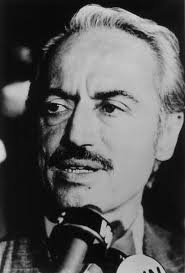Marvin Miller, whom Red Barber said was “one of the two or three most important men in baseball history, along with Babe Ruth and Jackie Robinson”, has died at the age of 95.
It is impossible to overstate Miller’s impact on Major League Baseball. While some — including Hall of Fame voters — have long given Miller short shrift (or piled on utter disdain), baseball today cannot be understood without understanding Marvin Miller’s contributions. He was a truly transformative figure who, after Jackie Robinson, did more to correct the excesses and injustices delivered onto players by baseball’s ruling class than anyone.
When Miller took over as the head of the MLBPA in 1966 there was no free agency. Players were told by ownership what they would make the following year and if they didn’t like it, tough. They couldn’t switch teams. They couldn’t do what any other worker can do and shop their services elsewhere. They were stuck thanks to baseball’s reserve clause and the ridiculous Supreme Court decision which exempted baseball and its owners from the antitrust laws.
Miller took all of that on and he won. He started small, negotiating the union’s first collective bargaining agreement with the team owners in 1968, which raised the game’s minimum salary from $6,000 to $10,000. In 1970 he got the owners to agree to arbitration for the first time. In 1970 Curt Flood, with Miller’s support and guidance, challenged baseball’s antitrust exemption — and the dreaded reserve clause, which kept players tied to one team against their wishes — in the courts. Flood ultimately lost that case in the landmark 1972 Supreme Court decision. The decision did not, however, blunt Miller’s resolve, and he took his fight to other forums.
In 1974 he exploited a loophole — and an oversight by Oakland Athletics owner Charlie O. Finley — to get Catfish Hunter free agency and baseball’s first $1 million contract. Up next: the whole enchilada. In 1974, he got Andy Messersmith and Dave McNally to play out the season without contracts, placing them in cross-hairs of the reserve clause and giving them standing to fight the provision in arbitration. In 1975 they won, with the Seitz Decision ushering in the age of free agency. Baseball players’ indentured servitude was over.
In all Miller led the union through three work stoppages: two short ones — 1972 and in spring training 1980 — and then the long, season-altering strike in 1981. In all three stoppages, the union prevailed. Overall during his tenure the average players’ salary rose from $19,000 to $241,000 a year and their working conditions improved dramatically. It is no understatement to say that Miller turned the MLBPA into the most effective and successful labor union in the United States. Not just in sports: in the entire United States.
The New York Times has a thorough obit that you should read as well. Truly, Miller was one of the giants of the game, who changed it for the better in a profound way. His exclusion from the Hall of Fame is a monument to pettiness and spite, but he took it in stride. Rest in peace, Marvin Miller.
UPDATE: Keith Olbermann remembers Marvin Miller.


I loved the bit in “A Whole New Ball Game” about him meeting with players and having one call him a communist. Miller was able to tell him that he had the highest security clearance from his work on the National War Labor Relations Board in World War II. He got players a cut of baseball card money when before they had been happy receiving Greenstamps.